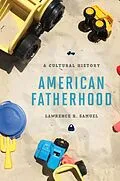American Fatherhood: A Cultural History traces changes in what it means to be a dad in America, from the 1960s through today. The book begins with an overview of fatherhood in America from the "founding fathers" through the 1950s and progresses to the role of fathers as they were encouraged to move beyond being simply providers to becoming more engaged parents, navigating complex and changing gender and family expectations.
By tracing the story of fatherhood in the United States over the course of the last half-century, American Fatherhood reveals key insights that add to our understanding of American culture. The book argues that, for most of the twentieth century, male parents were urged to embrace the values and techniques of motherhood. In recent years, however, fathers have rejected this model in place of one that affirms and even celebrates their maleness and their relationships with their children. After decades of attempting to adopt the parenting styles of women, in other words, men have finally forged a form of child-raising that is truer to themselves. In short, fatherhood has become a means of asserting, rather than denying or suppressing, masculinity-an original and counterintuitive argument that makes us rethink the idea and practice of being a dad today.
Autorentext
Lawrence R. Samuel is a Miami-based independent scholar who holds a Ph.D. in American Studies and an MA in English from the University of Minnesota, an MBA in Marketing from the University of Georgia, and was a Smithsonian Institution Fellow. Larry blogs for Psychologytoday.com, where he has received over a million hits, and is often quoted in the media.
Zusammenfassung
American Fatherhood: A Cultural History traces changes in what it means to be a dad in America, from the 1960s through today. The book begins with an overview of fatherhood in America from the founding fathers through the 1950s and progresses to the role of fathers as they were encouraged to move beyond being simply providers to becoming more engaged parents, navigating complex and changing gender and family expectations.
By tracing the story of fatherhood in the United States over the course of the last half-century, American Fatherhood reveals key insights that add to our understanding of American culture. The book argues that, for most of the twentieth century, male parents were urged to embrace the values and techniques of motherhood. In recent years, however, fathers have rejected this model in place of one that affirms and even celebrates their maleness and their relationships with their children. After decades of attempting to adopt the parenting styles of women, in other words, men have finally forged a form of child-raising that is truer to themselves. In short, fatherhood has become a means of asserting, rather than denying or suppressing, masculinityan original and counterintuitive argument that makes us rethink the idea and practice of being a dad today.
Inhalt
Introduction
1. America's Newest Endangered Species
2. The New Fatherhood
3. The Daddytrack
4. The Role of a Lifetime
5. Manny Knows Best
Conclusion
Notes
Selected Bibliography
Index
